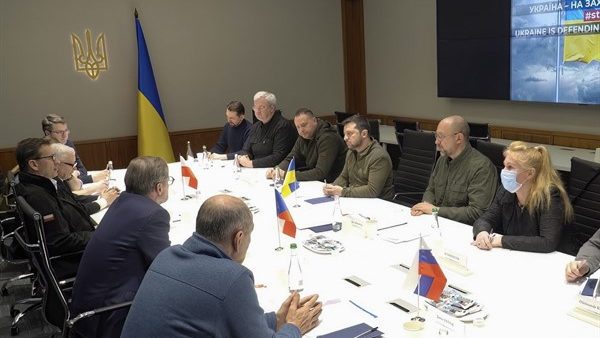Diplomats in Brussels breathed a sigh of relief yesterday following the safe return of three leaders from the European Union’s eastern bloc who made a surprise visit to Ukraine earlier this week. The prime ministers of Poland, Slovenia and the Czech Republic met with Ukrainian President Volodymyr Zelensky in Kyiv on Tuesday evening. Their visit was cheered across Europe as a brave gesture of support and solidarity for Ukraine. But for EU diplomats, the unilateral initiative was nonetheless alarming news that does not bode well for the continental and trans-Atlantic unity on display within the EU and NATO since Russia’s invasion three weeks ago.
The three leaders—who were joined on the trip by Jaroslaw Kaczynski, the leader of Poland’s governing Law and Justice party who is widely considered to be the power behind the throne in Warsaw—publicly announced their visit while they were crossing into Ukraine by rail, prompting fears for their safety. The news came as a shock to several diplomats in Brussels who reportedly had not been informed about the visit. A collective intake of breath could be heard in the city when the news broke, given the endless worst-case scenarios that could emerge from such a high-profile visit to a conflict zone. What would happen if they became trapped in Kyiv, which has become increasingly besieged this week by Russian forces? Or worse, what would happen if they were killed in the middle of the fighting—or in transit? The CEO of Ukrainian Railways criticized them for announcing their trip while they were still en route to Kyiv, describing it to CNN as “naive.”
Things took an even more dramatic turn when, upon arriving in Kyiv, the three leaders claimed to be representing the European Union, telling local media their visit had been endorsed by other EU leaders at last week’s summit in Versailles. But no such discussion between the three leaders and their EU colleagues took place, according to national officials. A commission spokesperson explained that the Polish prime minister had privately told European Commission President Ursula von der Leyen and European Council President Charles Michel about “a potential visit to Kyiv” on the sidelines of last week’s summit. The three prime ministers reportedly only updated von der Leyen and Michel with final plans about their trip the night before they departed for Kyiv. An EU official said the visit was an initiative of the three prime ministers with “no mandate from the European Council.” When he was told of the plan, Michel “pointed at the security risks of such a travel,” while recognizing the need to show support for Ukraine, according to the official.

